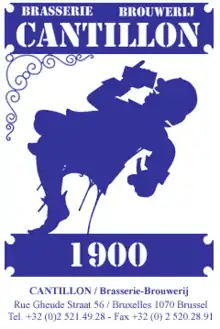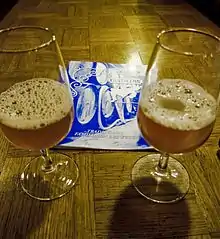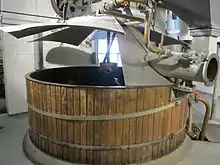Cantillon (brewery)
Brasserie-Brouwerij Cantillon ("Brewery Cantillon") is a small Belgian traditional family brewery based in Anderlecht, Brussels. Cantillon was founded in 1900 and brews exclusively lambic beers.
 | |
| Industry | Alcoholic beverage |
|---|---|
| Founded | 1900 |
| Founder | Paul Cantillon Marie Troch |
| Headquarters | , |
| Products | Beer |
| Owner | Jean-Pierre Van Roy |
| Website | http://www.cantillon.be |
Overview
The brewery was founded in 1900 by Paul Cantillon, whose father was a brewer as well, and his wife, Marie Troch.[1] As of 2011, the owner is Jean-Pierre van Roy, fourth-generation brewer at Cantillon.[2] Since its foundation the only major change has been a shift to organic ingredients in 1999.[3] Cantillon was one of more than one hundred operating breweries in Brussels at its foundation, and was the only one to remain operational through the 2000s.[1][4] In 2014, van Roy announced that the brewery would be acquiring more maturation space, effectively doubling production by 2016-17.[5]
Cantillon produces 400,000 bottles of beer a year.[6]
Beers

In the traditional lambic style, beers, with a mash bill of 2/3 malted barley and 1/3 unmalted wheat,[1] are spontaneously fermented in open topped attic mounted vats, aged in oak or chestnut, blended (from different batches and ages), bottled, and then bottle conditioned for a year. Half of the brewery's production is gueuze; once a year a batch of kriek is made.[3] For fruit-flavored beers, empty casks are filled with various fruits and macerated for three months to dissolve the fruits; young lambic is added to supply sugar for fermentation.
- Blåbær - bilberry (made every year for a bottle shop in Denmark)
- Cuvée Saint Gilloise - This is not a traditional ’gueuze, in that it is made from only two-year-old lambic, not from a blend of old and young beers. It is also dry-hopped in the cask for three weeks with fresh Styrian Golding hops. Re-fermentation in the bottle is achieved with the addition of a small amount of candy sugar.
- Fou' Foune - apricot[3]
- Grand Cru Bruocsella - unblended lambic aged for three years, and refermented with liqueur d'expedition[3]
- Gueuze[3]
- Iris - 100% pale barley malt beer with half fresh hops aged for two years and then dry-hopped[3] with Hallertau hops[1][3]
- Kriek - lambic made with cherries[3]
- Lou Pepe Gueuze - blended from beers of the same age, thus not a strictly authentic gueuze[3]
- Lou Pepe Kriek - with more fruit (cherries)[3]
- Lou Pepe Framboise - with more fruit (Raspberries)[3]
- Magic Lambic - 80% Lou Pepe Framboise and 20% blueberry lambic with vanilla[7]
- Mamouche - elderflower
- Nath - brewed with rhubarb
- Rosé de Gambrinus - framboise[3]
- Saint Lamvinus - Merlot and Cabernet Franc grapes[3]
- Soleil de Minuit - cloudberry (made in 1999 and in 2013)
- Vigneronne - Muscat grapes[3]
Gueuze Museum

The brewery also houses the Gueuze Museum.[8] Patricia Schultz listed the brewery and its museum in 1,000 Places to See Before You Die.[9]
References
- McFarland, Ben (2009). World's Best Beers: One Thousand Craft Brews from Cask to Glass. Sterling. pp. 100–101. ISBN 9781402766947. Retrieved 27 May 2012.
- Koch, Greg; Allyn, Matt (2011). The Brewer's Apprentice: An Insider's Guide to the Art and Craft of Beer Brewing, Taught by the Masters. Quarry Books. pp. 272–84. ISBN 9781610581592. Retrieved 27 May 2012.
- Oliver, Garrett; Colicchio, Tom (2011). The Oxford Companion to Beer. Oxford UP. pp. 216–17. ISBN 9780195367133. Retrieved 27 May 2012.
- Stange, Joe (7 December 2010). "Brasserie de la Senne Versus the Universe". Draft. Retrieved 29 January 2015.
- Nason, Adam (August 2014). "Cantillon to double production with help of new building". BeerPulse.com. Beer Pulse. Retrieved 22 January 2015.
- Boffey, Daniel (2018-09-10). "One of world's oldest beer varieties 'at risk from climate change'". The Guardian. Retrieved 2020-03-09.
- "Cantillon Magic Lambic". lambic.info. Retrieved 2019-05-30.
- Brussels Gueuze Museum Archived 2012-03-04 at the Wayback Machine, europe-cities.
- Schultz, Patricia (2011). 1,000 Places to See Before You Die, the second edition. Workman. p. 92. ISBN 9780761168713. Retrieved 27 May 2012.